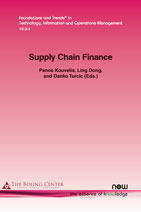Introduction to the Special Issue on Supply Chain Finance
By Panos Kouvelis, Olin Business School, Washington University in St. Louis, USA, kouvelis@wustl.edu | Ling Dong, Olin Business School, Washington University in St. Louis, USA, dong@wustl.edu | Danko Turcic, Olin Business School, Washington University in St. Louis, USA, turcic@wustl.edu
Abstract
This special issue, which surveys the most recent research in supply chain finance, is motivated by the success of the third “Supply Chain Finance & Risk Management Workshop,” which was held at the Olin Business School of Washington University in St. Louis, on May 14-15, 2017. The Editors wanted a more timely access to the latest research on supply chain finance and supply chain risk management. It is well-known, that due to review process lead times, articles published in traditional journals can take 2 to 3 years. The idea of producing an edited volume, which would include the latest articles on the topics above appealed not only to the workshop participants but also to other active members of the iFORM (Interface of Finance, Operations, and Risk Management) research community. Foundations and Trends in Technology, Information and Operations Management provides an ideal outlet for such a volume.
Supply Chain Finance
Supply Chain Finance focuses is on creating liquidity in the supply chain through various Buyer or Seller-led solutions with or without a facilitating technology. The role of supply chain finance (SCF) is to optimize both the availability and cost of capital within a given buyer-supplier supply chain. To add further value, information on the physical flow of goods can be monitored. The coupling of information enables lenders to mitigate financial risk within the supply chain. The mitigation of risk allows more capital to be raised, capital to be accessed sooner, or capital to be raised at lower rates. Supply chain participants reside in diverse economic environments, are of different sizes, face a variety of uncertainties, have different bargaining powers over its trading partners, and have different accessibilities to capital markets. Many forms of financing arrangements between buyers and suppliers have emerged intending to overcome challenges in their specific economic and business environments.
Part 1 examines Supplier Financing. The three papers included in this section discuss supplier based financing issues including: motivation and rationale for supplier based financing, the optimal mix of bank financing and supplier financing, and empirical study of the impact of trade credit on firm performance. Part 2 focuses on Buyer Financing including three papers included that discuss buyer based financing issues in supply chains including the rationales of different types of buyer based financing arrangements and their impacts on supply chain performance. Part 3 reviews Inventory Models and Financing Consideration and the two papers in this part of the book explore how to coordinate the management of the cash flow and inventory flow within an organization and the relationship between a firm’s inventory policy and its cost of capital. Part 4 examines Operational Investments and Financing Issues and includes four papers that address operational investments with explicit financing considerations.

Companion
Foundations and Trends® in Technology, Information and Operations Management, Volume 10, Issue 3-4 Special Issue: Supply Chain Finance
See the other articles that are also part of this special issue.